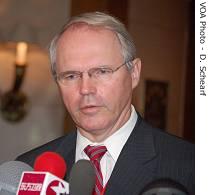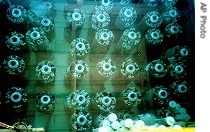2007年VOA标准英语-N. Korean Nuclear Diplomacy Now in the Hands of
搜索关注在线英语听力室公众号:tingroom,领取免费英语资料大礼包。
(单词翻译)
By Kurt AchinSeoul
26 July 2007
Diplomatic efforts to end North Korea's nuclear weapons programs are, for now, in the hands of technical experts. The working groups, as they are known, will spend next month sifting1 through details and definitions so they can propose the next steps in the negotiations2. VOA Seoul correspondent Kurt Achin looks at their main challenges.
 |
| Christopher Hill in Beijing, 19 Jul 2007 |
"You know, we're a bunch of diplomats4, ambassadors, who are talking about a subject that not all of us have worked on that much in our careers," he said.
Hill is the main U.S. delegate to six-nation talks aimed at eliminating North Korea's nuclear arms capabilities5. He met in Beijing with counterparts from North and South Korea, China, Russia, and Japan earlier this month, soon after Pyongyang shut down its main nuclear reactor6 in Yongbyon.
That shutdown fulfilled the first phase of a February agreement. The next phase requires North Korea to declare all its nuclear programs, as a step toward completely disabling them in exchange for energy aid. To that end, experts have been assigned to provide a list of steps to be taken, as well as definitions of key concepts.
The February agreement is the result of nearly four years of international effort to end North Korea's nuclear weapons programs. Although in the past Pyongyang has pledged to not develop nuclear bombs, in 2002, U.S. officials said the country was secretly trying to build them.
That led to a series of sanctions and several rounds of talks with North Korea. Despite the diplomatic push, last year North Korea tested its first nuclear explosion.
Lee Eun-chol, a nuclear engineering specialist at Seoul National University, says that determining what should be in the North Korean nuclear declaration is in itself a demanding technical chore.
Lee says North Korea has responded to previous International Atomic Energy Agency requests for information by submitting lists of facilities with little or no relevance7 to nuclear weapons.
He also notes that nuclear inspectors8 have had to put together their own database of information obtained in other ways. And Lee adds that Pyongyang probably will try to protect some of its more sensitive facilities.
 |
| North Korea's spent nuclear fuel rods, which are kept in cooling pond, are seen at nuclear facilities in Yongbyon (file photo) |
One working group will study the other side of the February agreement. If it cooperates in the second phase, impoverished10 North Korea is to receive 950,000 tons of fuel oil or other energy aid of equal value.
Negotiators say providing only fuel oil would not only fail to serve the North's long-term interests, but could also allow Pyongyang to stall on future commitments. If North Korea is assured of an oil supply, it has little incentive11 to move forward on disarmament until the oil runs out.
As a result, U.S. Ambassador Hill says the U.S. and its partners will provide a variety of aid that meets the North's overall needs.
"Option A might be additional storage capacity [for fuel], option B might be a [power plant] refurbishment, option C might be the provision of electricity from a neighboring country - something like that. But we need the experts to kind of look at this," said Hill.
Tim Savage12 is an analyst13 with the Nautilus Institute, which researches energy and security issues related to North Korea. He says a diversified14 package of energy aid would most benefit the country.
"North Korea's energy shortage goes well beyond simple fuel shortages," he said. "What you have is essentially15 a dilapidation16 of the entire energy system, from the mining of coal to the power plants, to the transmission lines, down to the end-use equipment."
The working groups are expected to meet until late August or early September. Delegates from the six nations hope to reconvene in September, once they have studied the groups' recommendations.




